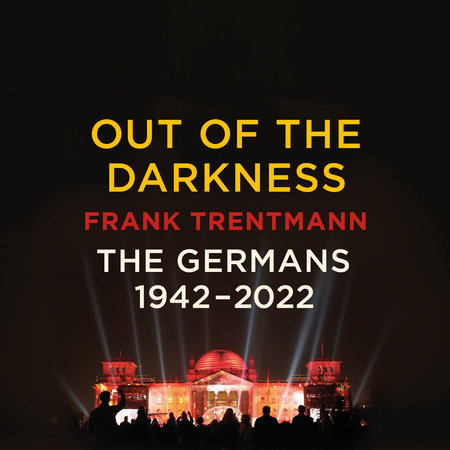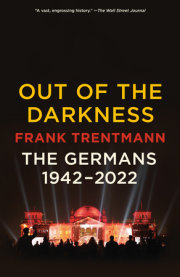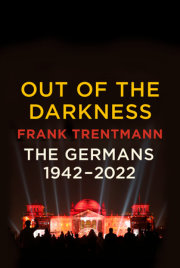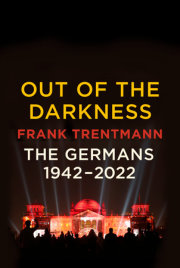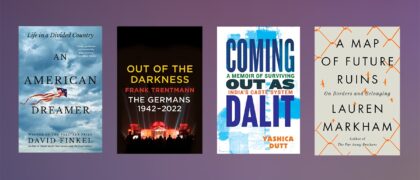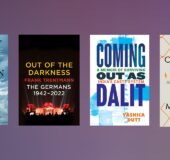#1 Political Book of 2023, Sueddeutsche Zeitung (Germany)
A Best Book of 2023, The Telegraph (United Kingdom)
#1 Best Non-Fiction Book December 2023 and January 2024 at Die Zeit, ZDF, Deutschlandfunk, and taz (Germany)
A New Yorker "Best Books of the Year We Have Read So Far"
“[A] rich, ambitious account of Germany’s improbable rise from a moral abyss to a prosperous democracy that is sometimes held up as a bulwark of stability and liberal values… [the book] remains fresh and surprising throughout, thanks in part to Trentmann’s knack for drawing on an astounding range of voices.” —Bryn Stole, The Washington Post
"Outstanding... A probing moral history."—Timothy Garton Ash, New York Review of Books
"Remarkably rich...Out of the Darkness usefully reveals the roots of [modern Germany's] ethical knots. Trentmann is still hopeful that Germans can untangle them."—New York Times Book Review
"Never dull...the moral remaking of Germany is a complicated tale...[and] a tale that Mr. Trentmann is well placed to tell... [a] vast, engrossing history." —Ian Brunskill, The Wall Street Journal
"Trentmann draws from a wide range of sources, including amateur plays and essays by schoolchildren. These lend intimacy to his portrait of a citizenry engaged in the continuous process of formulating its own views of right and wrong as it debates issues from rearmament to environmentalism." —"The Best Books We've Read in 2024 So Far," The New Yorker
"A magisterial history of Germany over the last 80 years... penetrating... thougful... [With] [f]ascinating insights on how a country of poets, philosophers, and scientists emerged from totalitarianism and genocide."—Kirkus Reviews
"Trentmann’s sweeping narrative is grounded in vivid snapshots...a penetrating and immersive look at a society attempting, if sometimes failing, to morally right itself." —Publishers Weekly
"Masterly. Frank Trentmann's wide-ranging, deeply researched, nuanced evaluation of changing German mentalities and moral challenges since the Nazi era is a tour de force."—Ian Kershaw, author of Hitler
"In this magisterial book, Frank Trentmann charts how the Germans responded to the moral responsibilities that they faced as perpetrators of a war of annihilation and of the mass murder of the European Jews. Discussing transformations in East and West Germany, Trentmann highlights the trade-offs between moral reorientation and economic reconstruction. Portrayed on a broad canvas, this is a history of post-war Germany for our crisis-ridden times."—Benjamin Ziemann, author of Hitler's Personal Prisoner: The Life of Martin Niemöller
“I could not put the book down. The way Frank Trentmann writes history, the way he brings together great and small, analysis and narrative, is wonderful.” —Bernhard Schlink, author of the international best seller The Reader
"A milestone of historical writing" —Frankfurter Rundschau
Trentmann adds another layer to the history of events: the accompanying self-reflection among the Germans, with all their contradictions, their conflicts, their insights and errors. This is original, enlightening and entertaining. We find ourselves in these pages and are amazed!" —Sueddeutsche Zeitung
"Impressive ... shows how German history can be told in a new way'" —Wolf Lepenies, Die Welt
"A great panorama." —Hamburger Abendblatt
"Compelling...a deeply serious work that moves gracefully between the moral challenges that are his central concern and the more familiar categories of politics, law and culture." —David Blackbourn, Literary Review
"Outstanding... A meticulous and well-judged account of Germany from 1942 to today [that] shows how it transformed itself from pariah nation to leader of a continent." —"Best Books of 2023," The Daily Telegraph
"Magisterial."—New York Review of Books
"Monumental... a remarkable book...[with] original and unique insights into the lived history of the Germans... [It] succeeds like no other broad overview to combine the width and depth of human voices with an overarching narrative ...stimulating, immensely rich and very readable."—Frank Biess, Sueddeutsche Zeitung
"An impressive account of how Germany built a new identity for itself after the barbaric Nazi years...terrifically insightful...This book runs to 838 pages, but barely a word is wasted. Trentmann is a skillful and unflashy storyteller with flickers of gentle irony. Echoing Tolstoy’s theory of history as the 'sum of human wills,' he aims to stitch the scraps of everyday experience into a quilt of grand narrative... [with] richness, colour and subtlety." —Oliver Moody, The Times (London)
"Excellent .... Trentmann's study marshals an immense amount of evidence in response to a single basic question: how did Germans reassert themselves as morally oriented human beings?"—The Times Literary Supplement
“Give[s] a deep insight into how Germany and its people grappled with questions of guilt and identity....navigates complex issues like self-pity, denazification, immigration, reunification and military intervention with refreshing clarity. This book couldn’t be more timely.”—BBC History Magazine, Katja Hoyer
"Frank Trentmann’s rich and brilliant Out of the Darkness traces the moral and material history of Germany since the Second World War through the lives of its people. Wonderfully readable and compelling, it introduces us to Christian peaceniks, 'red' militarists, frustrated feminists, unappreciated 'guest workers,' and a host of other unexpected and diverse Germans, illuminating the achievements and failures of the nation that emerged from the Third Reich."—Suzanne L. Marchand, Author of Porcelain: A History from the Heart of Europe and Down from Olympus
"Frank Trentmann’s enthralling account of the Germans since 1942 is rooted in a brilliant insight: that the morality Germans invoked in their struggle to make sense of their place in history was never a transcendent standard, but a malleable and contingent substance whose nature was always contested. This fascinating and compelling moral history takes us to the centre of modern Germany’s self-understanding, moving elegantly between politics, economics, culture and the private reflections of individuals." —Christopher Clark, Author of The Sleepwalkers and Revolutionary Spring
"Trentmann has scoured endless source materials to provide a very nuanced, but in fact wise book. We see in his study of the effects of various acts, laws, international actions, and other winds of change how its varied population has responded for well or ill. You’ll feel as if you’ve been there, listening to Germans"—Decatur Daily

